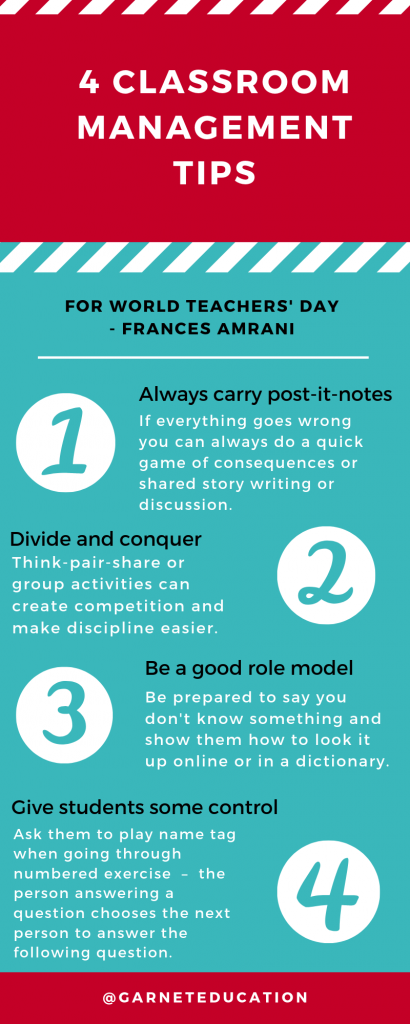
Happy World Teachers’ Day to all teachers around the world! This year, the theme is: Young Teachers: The future of the Profession. With this in mind, we decided to ask you for some help! We put together a set of questions that might be on the mind of young ELT teachers around the world. We asked experienced ELT teachers for any invaluable tips and advice they might have.
Special thanks to Tyson Seburn, Julietta Schoenmann, Dale Prince, Frances Amrani, and Eric Roth for their input!
And now … here are some excellent tips from ELT teachers around the world.
How do you keep your students interested and engaged in English?
“Probably obvious but often overlooked – find out what your students are interested in and tailor your lessons to them. So if a kid is football mad, don’t do the ‘clothes’ lesson on school uniforms etc, do it about football kits!”
“Make sure you include elements of surprise and the unexpected. Value pacing and tension in a lesson. Remember to include quiet parts in a lesson so they appreciate the dynamic interactive parts. Really listen to your students’ opinions and get them to expand with examples and evidence.”
“I try to show them that what they’re learning serves a purpose and once you do that and they get it, they tend to be more invested.”
“Keep the stimulus fun and exciting.”
“By making it relevant to their needs and engaging in the short term. I don’t tend to major on why English is important for their future studies, work opportunities etc etc but focus on making each lesson an enjoyable and productive experience. I always remember my biology lessons at school – I didn’t have any plans to study biology later at university but the teacher made the lessons so interesting that I was always keen to learn.”

Do you have any tips for someone entering their first year of teaching? If you could go back in time to your first day of teaching, what advice would you give yourself?
“If you don’t have a qualification and don’t think you’re going to be properly trained, read a book or watch a few YouTube videos of good English teaching practice. It’s amazingly helpful to see how other people do it!”
“Work on creating a positive group dynamic – through ice-breakers, warmers and getting to know your students as people.”
“Don’t be a slave to your lesson plan. It is just an efficient road map and you may need to take the scenic route with your class, which can be even more rewarding.”
“Getting it wrong is okay. Build up a bank of strategies early.”
“I’d tell myself to relax a little. Yes, planning a lesson will seem like an incredible amount of work at first, but it’ll get simpler as time goes on and you’ll feel more comfortable with your materials, so give yourself a break.”
Do you have any classroom management tips?
“I really like using the silent hand signal to get adult groups’ attention after discussion. Tell your students that when they see you raise your hand they should raise their hand and stop talking. Silence falls within seconds and it works like magic. Look out for the odd student who raises their hand and keeps talking…not so magical!”

“Try to set up activities clearly, make sure everyone understands what’s going on, and then talk as little as possible.”
“Vary things up. Try grouping learners in different ways through pedagogical choices, like using coloured paper with a task on it to group by colour. That way it’s not on you or them to decide, but it’s built into the activity itself.”
Do you have any tips for starting off on the right foot with other teachers?
“Share lesson ideas. Offer advice about ‘difficult’ students. Don’t ever even joke about your colleagues’ accents not being ‘correct’.”
1. Ask for their advice – what has worked for them may work for you
2. Share ideas – if you have found something works don’t keep it to yourself
3. Remember everyone has bad days – be supportive
“Take advice even if you don’t need it.”
“Don’t be a know-all! Actively listen to what others say.”
“Be open to sharing freely and talking about language stuff. A little commiseration is always bonding, but try not to go too far down that rabbit hole.”

Any other advice?
“Think of being a teacher a bit like being a mechanic – you need a toolkit, you need skills, you need a general understanding of the mechanism of learning and a specific understanding of your group of learners and what makes them tick. There isn’t always just one solution – there may be expensive solutions, quick fixes and cheap solutions. In the end you need to measure if appropriate learning is taking place and if progress is being made at a realistic rate.”
“Find time for you. Your health and well-being is worth more than the pressures found in a school.”
“Celebrate making ‘good mistakes’ that create teachable moments. Encourage questions. Establish classroom rituals. Focus on individual learners making significant & meaningful growth toward their individual goals through speaking English. Remember that conversation skills count!”
“Bring global issues topics into the classroom where possible. Our current troubled world needs students who can articulate their values, exercise tolerance, embrace diversity, empathise with those around them and protect the planet. ELT offers rich possibilities for exploring many different GI topics and students, far from finding them dull or depressing, actually enjoy talking about them.”
“You’ll be fine. Recognise you’re in a profession; build a network around you or online; keep learning.”
Thanks so much to all the teachers and ELT professionals that sent in some advice. If you’re a young teacher, we hope these tips and advice can help you to gain some confidence when teaching.
Do you have any other advice you think has been missed? Leave a comment below!



Thanks
You’re welcome!
Thanks……….